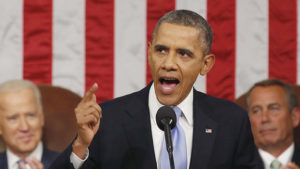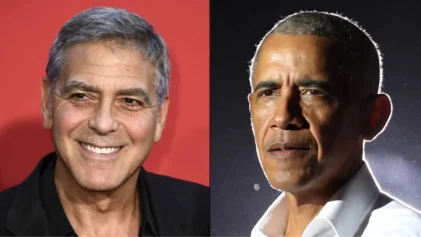
It’s like bragging about your jump shot when you’re in the middle of a game of chess. The stuff Obama was orating about has very little to do with the everyday angst of Americans in 2015.
For American households, it is the threat of joblessness that tops the list of the most pressing concerns, according to a poll released this week by Al Jazeera America/Monmouth University. Asked to describe the biggest concern facing their family, 16 percent of poll respondents said either job security or unemployment. The second most-cited concern was health care costs, followed by everyday bills.
Interestingly, it was the middle-class who cited job security and unemployment more than the poor. For poll respondents making over $50,000, it was the biggest worry, the thing that keeps them awake at night.
President Obama last night called it “middle-class economics,” the push to make changes that will ease the minds and clear the path for the middle-class. But unless he can change the basic nature of the predatory capitalist model that has substantially enriched a few while the rest of us suffer, then his proposals are just tinkering around the edges of the problem. They will not change our lives.
It’s great to offer free community college to Americans, as the president proposes, but once they leave community college and secure a marginal job, where their wages will remain stagnant for decades, where the company will decide to slash jobs to increase revenue and improve its share price so that the billionaires can buy more yachts, the crippling fear of a pink slip will be an ever-present reality gnawing at the edges of that worker’s sanity.
He said he wanted to raise taxes and close loopholes on the wealthy so he could cut taxes for the middle class. Not many would be against a few thousand more dollars in their bank accounts—but not many believe the Republicans in Congress, themselves either members of the one percent or substantially beholden to the one percent, would ever go along with that kind of redistribution of wealth.
It’s clear that we should call the system that operates in the US and around the world “billionaire economics.”
The anti-poverty charity Oxfam released a report this week saying that by next year, the top one percent will have more wealth than the remaining 99 percent of the planet. To break it down even further, there are 80 billionaires who have the same amount of wealth as the bottom 50 percent of the global population—meaning 3.5 billion people share the same amount of wealth as these 80 obscenely wealthy individuals.
And because the global recession has made the poor even poorer in recent years, the gap has been growing ever larger. In 2010, it took 388 billionaires to equal the wealth of the bottom half of the world’s population. But by 2014, the figure had fallen to just 80 billionaires.
For African-Americans, what’s clear is that the nature of the current economy is to keep the community’s suffering at extreme levels, with very little hope in sight. According to a study by Brandeis University’s Institute on Assets and Policies released in 2013, the wealth gap between white and Black families has exploded over the past 25 years, affecting the comfort of Black families, the viability of Black neighborhoods and the opportunities of successive generations of Black young people.
Brandeis followed up a 2009 survey of American households—which found that the medial wealth of white families was $113,149 compared with $6,325 for Latino families and $5,677 for black families—by tracing the same set of 1,700 working Americans households over 25 years, from 1984 to 2009. The researchers found over that period, the wealth gap between white and Black families nearly tripled, increasing from $85,000 in 1984 to $236,500 in 2009.
For each dollar in income increase during these years, white wealth grew $5.19 while Black wealth growth amounted to 69 cents.
Perhaps the most disturbing aspect of the survey was the revelation that the wealth gap is created by entrenched institutional factors connected to race and racism. The researchers found equal achievements, such as income gains, yield unequal wealth rewards for whites and Blacks. In other words, when Blacks and whites do the exact same things, put in the same amount of effort, whites will benefit at vastly greater levels than Blacks.
Blacks see these inequities all around them on a daily basis, in their workplaces, in their neighborhoods. And the effect is incredibly dispiriting and stressful.
We have reached the point where all the usual economic indicators, like unemployment rates and GDP and jobs created, don’t really tell what is the state of the U.S. economy. The economy should be measured by the worry etched across the faces of average middle-class parents, Black and white, Hispanic and Asian, wondering how they’re supposed to save for retirement and their children’s college educations when their salaries are being stretched thinner and thinner as the prices of goods and services rise while their paycheck doesn’t.
The economists need to add a new item to their checklist: the worry index.
“We believed we could reverse the tide of outsourcing, and draw new jobs to our shores. And over the past five years, our businesses have created more than 11 million new jobs,” Obama said during his speech. “At every step, we were told our goals were misguided or too ambitious; that we would crush jobs and explode deficits. Instead, we’ve seen the fastest economic growth in over a decade, our deficits cut by two-thirds, a stock market that has doubled, and health care inflation at its lowest rate in 50 years.”
These are admirable accomplishments, but aside from the healthcare improvements they are mostly indicators that point to vast increases in the fortunes of the 1 percent. None of them made a dent in the worry index.
The president said the right things about helping the middle-class, but he’s preaching to an audience that no longer believes he has the ability to change their fate.
“That’s what middle-class economics is—the idea that this country does best when everyone gets their fair shot, everyone does their fair share, and everyone plays by the same set of rules,” he said. “We don’t just want everyone to share in America’s success—we want everyone to contribute to our success.”
But if there’s one thing Americans know all too well by now, it’s that everyone is not playing by the same set of rules. That’s how we get to a point where we are living amidst the greatest income inequality in human history.
“Middle-class economics means helping working families feel more secure in a world of constant change,” Obama said. “That means helping folks afford childcare, college, health care, a home, retirement—and my budget will address each of these issues, lowering the taxes of working families and putting thousands of dollars back into their pockets each year.”
But the Americans watching know that the Republicans are in control of Congress and, in that environment, an Obama budget has about as much of a chance of passage as a bill to grant reparations to Black people.


